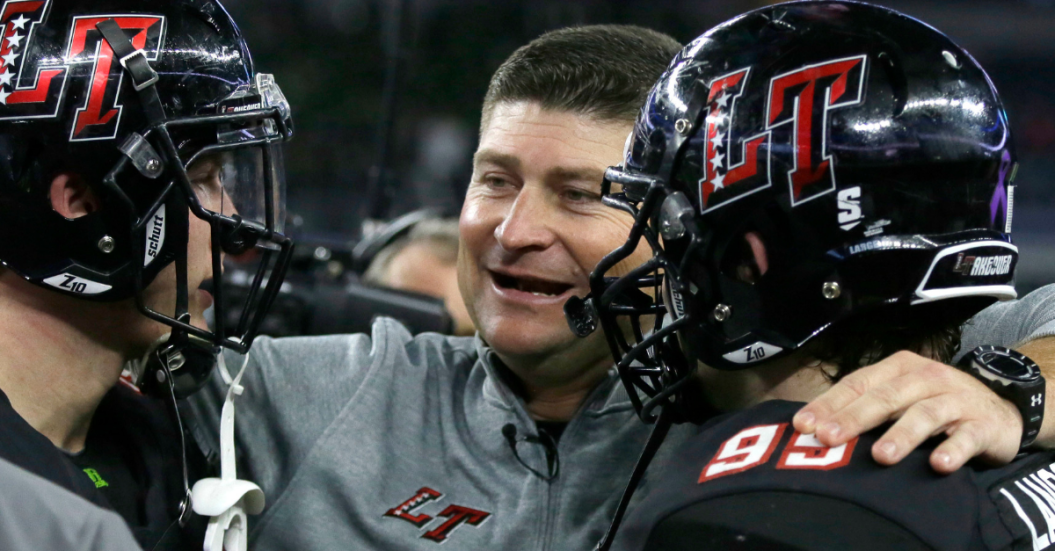AUSTIN, Texas (AP) — Texas will play high school football this fall, but some of it will be delayed, attendance will be limited and masks will be required as the state fights a surge in new coronavirus cases, hospitalizations and deaths.
Videos by FanBuzz
The University Interscholastic League released its guidelines for Texas public high school fall sports Tuesday, pushing back the start of the football and volleyball seasons for the largest schools by one month into late September. Football championships for those schools will be in January.
High school sports across the country are in doubt across the country. Already this week California announced it would delay fall high school sports until spring even as Florida officials decided to press ahead with no changes to its July 27 start. About a dozen states have delayed the start of football and fall sports while a few have canceled fall athletics altogether.
Texas has the highest participation in high school football in the nation with about 170,000 players, and Tuesday's announcement delays the start of the season for about 500 schools in Class 5A and 6A. Practices for those schools can start Sept. 7 with the first games set for Sept. 24.
Texas High School Football Schedule Changes
Modified UIL Activities Calendar & COVID-19 Guidelines for 2020-2021 School Year
Press Release ⬇️https://t.co/sv3boFOD43
Full COVID-19 Risk Mitigation Guidelines ⬇️https://t.co/o3qFFIZxrF
More COVID-19 Information ⬇️https://t.co/lE7fRyRbWY pic.twitter.com/vuWybpYVQ8
— Texas UIL (@uiltexas) July 21, 2020
Many of those Texas schools are located in large urban areas that have been hit hardest by the pandemic. Those same areas also include smaller schools, particularly in Houston and and Dallas-Fort Worth. Those schools will have to follow local rules.
The delay could last longer and include more schools if the health crisis gets worse, UIL Deputy Executive Director Jamey Harrison said. He said Texas just didn't want to take a fall season off the table as this point.
"The California model is still available to us," Harrison said. "If conditions change that dictate us delaying further, we still have that as a possibility."
The decision to press ahead with sports comes as school grapple with how to conduct the school year. Many Texas school districts are already adjusting the calendars for later starts and weeks of online learning to start the school year. The Houston school district, the largest in the state, won't meet on campus until mid-October.
Harrison noted that there is no date when all schools will be ready to begin at the same time.
California Delays HS Football to Spring 2021
BREAKING: High school football in California will be moved to the Spring of 2021, per release from @CIFState.
MORE: https://t.co/x5p6q8eLhM pic.twitter.com/w8NJIKEGvJ
— Stadium (@Stadium) July 20, 2020
Tim Teykl, head coach at Class 6A Alvin High School outside Houston, said he was happy with the delay because it is not a cancellation of the season.
"We're going to be around our kids in some form or fashion," Teykl said. "I'm fired up ... there's a glimmer of hope."
Texas will limit fans to 50% capacity in stadiums, and they must wear masks under a previous order issued by Gov. Greg Abbott. The governor's mask order allows local officials to opt out if the county has a low number of COVID-19 cases.
Texas hasn't played high schools sports since the boys' state basketball tournament was shut down in early March. The UIL allowed school to resume on-campus strength and conditioning workouts in June, but more than 200 schools at some point suspended those workouts amid the virus surge.
Last week, the Texas Association of Private and Parochial Schools, the state's largest governing body of private schools athletics, delayed the start of all sports for its 230 schools until September, with the first football games Sept. 28.
Karen Weaver, an associate clinical professor in Drexel's Center for Sport Management, said states are making tough choices on high school sports, and the Texas model appears to be good effort at threading the needle to balance a desire for sports and addressing serious health concerns
"On one level we all want sports back, that's a given," Weaver said. "Each state is trying to figure out what kind of cooperation they are going to get from their citizens and their behaviors."
